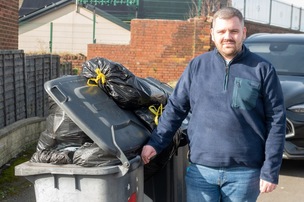A FATHER-OF-TWO died after his mental health support was reduced and he was left in a vulnerable mental state, an inquest was told.
Andrew Dable, of Cudworth View, Barnsley, died on August 21 last year from a self-inflicted stab wound to chest.
At an inquest held in Sheffield on Wednesday, coroner Stephen Eccleston was told that in the three weeks leading up to his death, Mr Dable took two overdoses and told his mother, Brenda Dable, that he had ‘considered stepping in front of a lorry’.
The inquest was told that the 48-year-old had a history of depression and was receiving support from two mental health teams - the Intensive Home-Based Treatment Team (IHBTT) and the Enhanced Mental Health Team (EMHT).
However, the coroner said that there appeared to be ‘serious communication problems’ between both services.
In a serious investigation report by West Yorkshire and Harrogate Health and Care Partnership, author of the report Naomi Sutcliffe looked at the period from April 4 2018 to August 21 2018. Through her investigation she said there were ‘clear gaps’ in the services Mr Dable received.
Ms Sutcliffe said: “There was concern about Andrew’s dependency on services and medication. They (the EMH team, who were the main team to help Mr Dable) wanted to move him to psychotherapy. They wanted to increase activities outside of the home.”
Ms Sutcliffe said that there were discrepancies between the two care teams, who stopped daily visits. She told the court that Mr Dable was stepped down from the Flexible Assertive Community Treatment (FACT) model, ran by the EMH team, which had seemed to be proving beneficial for him.
Mr Dable’s mother said that she was the full-time carer for her son and she thought there were many issues with the services provided.
“With Andrew, they (EMHT) knew he had suicidal thoughts,” Brenda told the inquest. “There was a time I called the doctor out and he told me he wasn’t going to come - I told him I wasn’t happy with the service and he came that afternoon.
“Andrew asked for the EMH team to be involved for more support. Someone came to talk to him for 20 minutes and told him to do breathing exercise and write down what he was doing.
“No-one was liaising with him and I was his carer - a non-paid one let’s put it that way. I was left there myself.
“If they had listened to me on Saturday morning... I asked if he could go in hospital and they said no.
“It was as though he was staring through me. He didn’t want to talk about it and I wasn’t being taken seriously.”
Mr Eccleston said one of the main problems with the service provided was that the family of Mr Dable did not know the difference between the mental health teams as it ‘was not explained’.
However, Mr Dable’s psychiatrist, Dr Ankamma Kandru, from the EMH team, said he believed the care team did ‘all it possibly could’ for Mr Dable.
“The patient had depression and psychotic symptoms and a diazepam dependency,” said Dr Kandru. “I believe he had deep-rooted psychological issues that he was not able to process and discuss with me.”
When questioned whether he believed that enough was done for Mr Dable, Dr Kandru said he believed he had done his best and was ‘completely shocked’ when he found out he had took his own life.
He added: “There was always the risk of him taking his own life because of his history. I didn’t feel at that point he would act in that way. I was shocked when I found out that Mr Dable had died the next day.”
Summing up the inquest, the coroner said that Mr Dable died from a stab wound to the chest, adding that things could have been different and that there was a ‘failure to listen to the family’s concerns’.
He said: “I found the serious incident report to be thorough and broad ranging. It was open and reflective in speaking about learning lessons from Andrew Dable’s death.”



























